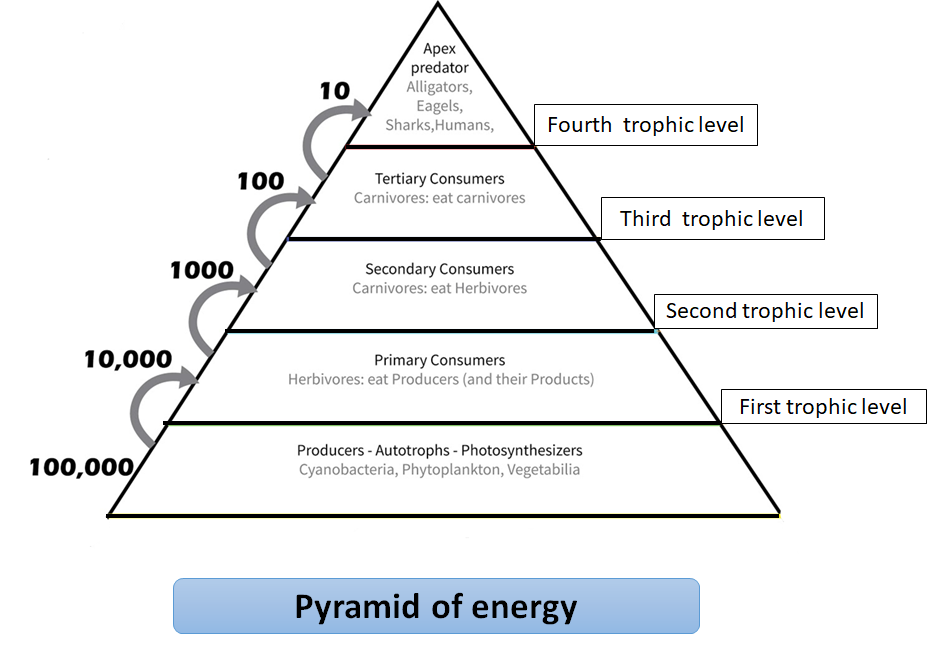
$10\%$ law of flow of energy in the ecosystem was proposed by
(a) Lindeman
(b) Carl Mobius
(c) Tansley
(d) Darwin
Answer
573.9k+ views
Hint: According to the $10\%$ rule, during the transition of organic food energy from one trophic level to the next higher level, only about ten percent of the transferred energy is retained as flesh. The remainder is lost during transfer, broken down in respiration, or lost through the higher trophic level to incomplete digestion.
Complete answer:
- The ten percent rule of transfer of energy from one trophic level to the next is being credited to Raymond Lindeman (1942).
- Energy is passed through the food chains, but from one trophic stage to the next, the amount of usable energy decreases.
- The explanation for this is that only about 10 percent of the energy is transferred to the next trophic stage.

- This $10\%$ energy is transferred in the form of chemical bonds present as in biomass(organic molecules) of the organism when consumed is converted into ATP via respiration.
- Large amounts of energy are lost from the ecosystem between one trophic level and the next level as energy flows from the primary producers through the various trophic levels of consumers and decomposers.
- The main reason for this loss is the second law of thermodynamics, which states that whenever energy is converted from one form to another, there is a tendency toward disorder (entropy) in the system.
- Energy diminishes as it climbs trophic levels since energy is lost as metabolic warmth when the creatures from one trophic level are devoured by life forms from the following level.
So, the correct answer is ‘’(a) Lindeman”.
Note:
- Net efficiency of production (NPE) determines how effectively each trophic level utilizes and transforms the energy from its food into biomass to fuel the next trophic level.
- Endotherms have a low NPE and need more energy for heat and respiration than ectotherms, so to get the energy they need for survival, most endotherms have to feed more often than ectotherms.
Complete answer:
- The ten percent rule of transfer of energy from one trophic level to the next is being credited to Raymond Lindeman (1942).
- Energy is passed through the food chains, but from one trophic stage to the next, the amount of usable energy decreases.
- The explanation for this is that only about 10 percent of the energy is transferred to the next trophic stage.

- This $10\%$ energy is transferred in the form of chemical bonds present as in biomass(organic molecules) of the organism when consumed is converted into ATP via respiration.
- Large amounts of energy are lost from the ecosystem between one trophic level and the next level as energy flows from the primary producers through the various trophic levels of consumers and decomposers.
- The main reason for this loss is the second law of thermodynamics, which states that whenever energy is converted from one form to another, there is a tendency toward disorder (entropy) in the system.
- Energy diminishes as it climbs trophic levels since energy is lost as metabolic warmth when the creatures from one trophic level are devoured by life forms from the following level.
So, the correct answer is ‘’(a) Lindeman”.
Note:
- Net efficiency of production (NPE) determines how effectively each trophic level utilizes and transforms the energy from its food into biomass to fuel the next trophic level.
- Endotherms have a low NPE and need more energy for heat and respiration than ectotherms, so to get the energy they need for survival, most endotherms have to feed more often than ectotherms.
Recently Updated Pages
Master Class 12 Economics: Engaging Questions & Answers for Success

Master Class 12 Physics: Engaging Questions & Answers for Success

Master Class 12 English: Engaging Questions & Answers for Success

Master Class 12 Social Science: Engaging Questions & Answers for Success

Master Class 12 Maths: Engaging Questions & Answers for Success

Master Class 12 Business Studies: Engaging Questions & Answers for Success

Trending doubts
Which are the Top 10 Largest Countries of the World?

What are the major means of transport Explain each class 12 social science CBSE

Draw a labelled sketch of the human eye class 12 physics CBSE

What is a transformer Explain the principle construction class 12 physics CBSE

Why cannot DNA pass through cell membranes class 12 biology CBSE

Differentiate between insitu conservation and exsitu class 12 biology CBSE




